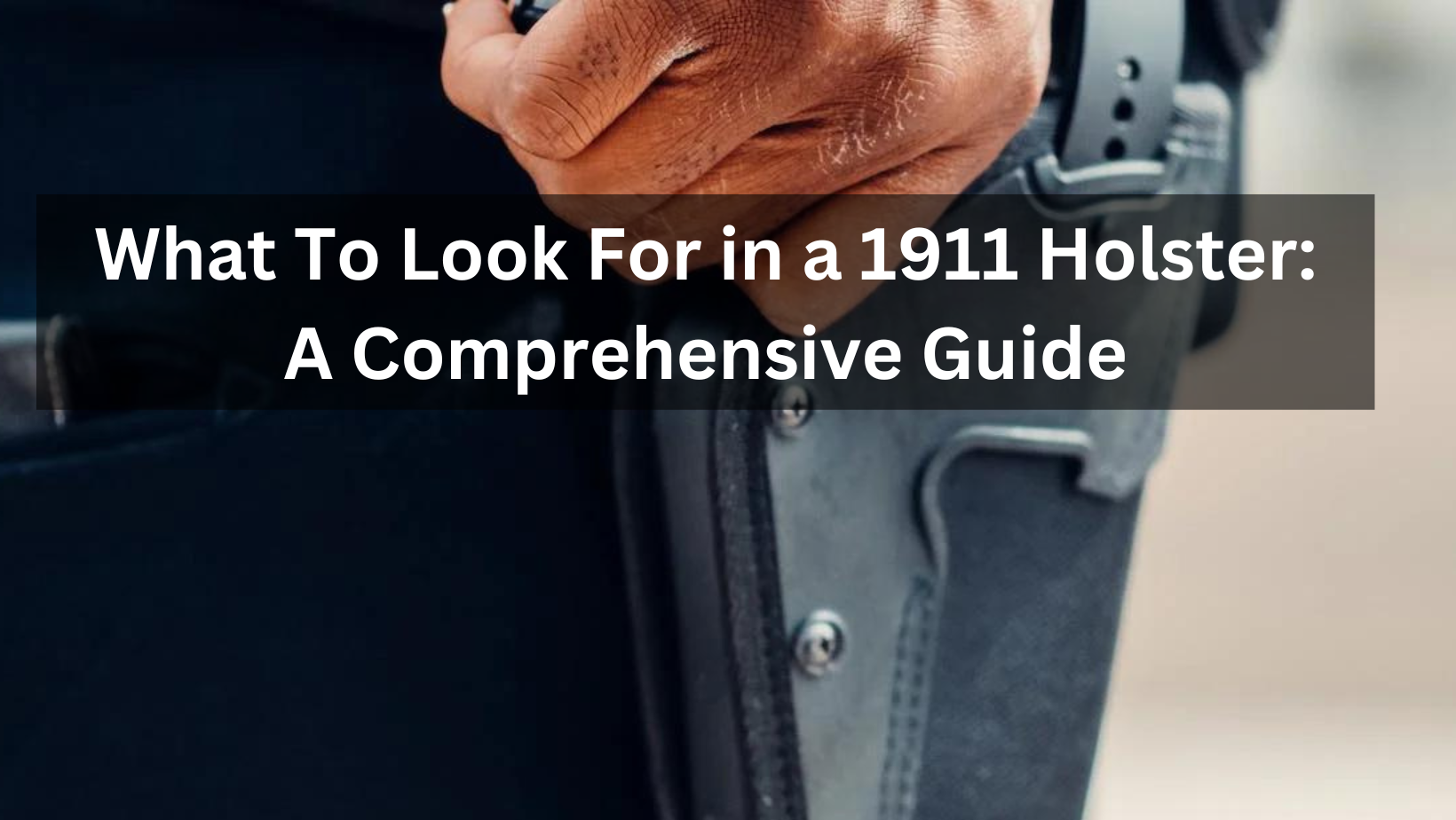If you own a 1911, you understand the importance of having a reliable and secure holster. Whether you’re a seasoned gun enthusiast or a first-time owner, finding the right holster is crucial for comfort, accessibility, and safety. In this comprehensive guide, we’ll explore the key factors to consider when choosing the perfect 1911 holster.
1. Material Matters
The first thing to consider when searching for a 1911 holster is the material. Holsters come in various materials, each offering unique advantages. Common materials include leather, Kydex, and nylon.
– Leather Holsters
Leather holsters are classic and known for their comfort. They conform to the shape of your gun over time, providing a snug fit. However, they may require more maintenance and can be affected by weather conditions.
– Kydex Holsters
Kydex is a durable and lightweight thermoplastic that is moulded to fit your specific firearm. These holsters offer excellent retention and are resistant to moisture and temperature changes. Kydex holsters are a popular choice for those looking for a secure and low-maintenance option.
– Nylon Holsters
Nylon holsters are affordable and lightweight. They are often chosen for their versatility and easy maintenance. However, they may lack the rigidity and durability of leather or Kydex.
Consider your personal preferences and the intended use of your 1911 when selecting the holster material that best suits your needs.
2. Carry Style: Finding Your Comfort Zone
Holsters come in various carry styles, and the right one depends on your preferences, body type, and intended use. Here are some common carry styles:
– Inside the Waistband (IWB)
IWB holsters are worn inside the pants, providing excellent concealment. They are favored for everyday carry and are generally comfortable for extended wear. Look for an IWB holster with adjustable cant for a personalized draw angle.
– Outside the Waistband (OWB)
OWB holsters are worn outside the pants, making them easier to draw from. They are often chosen for open carry and range use. Ensure the OWB holster has a secure and adjustable belt attachment for stability.
– Shoulder Holsters
Shoulder holsters are worn over the shoulders, distributing the weight of the firearm. They are a popular choice for those who spend long hours seated. When choosing a shoulder holster, ensure it provides proper firearm retention and easy access.
– Appendix Carry
Appendix carry holsters are worn in the front of the body. This style offers quick access to the firearm but may be less comfortable for some individuals. Look for an adjustable appendix holster to find the right balance between comfort and accessibility.
3. Retention Mechanism: Balancing Security and Accessibility
The retention mechanism of a holster is crucial for both security and accessibility. It ensures that your 1911 stays in place when you need it and allows for a smooth draw when the situation demands.
– Thumb Break
Holsters with a thumb break feature a strap that goes over the back of the firearm, secured with a snap button. This mechanism adds an extra layer of security but may slow down the draw. Consider your level of training and the intended use of your firearm when opting for a thumb break holster.
– Passive Retention
Passive retention holsters rely on the friction between the holster and the firearm to keep it in place. They are known for their quick and natural draw. Look for adjustable tension screws to customize the retention level according to your preference.
– Active Retention
Active retention holsters have an additional locking mechanism, such as a button or lever, to secure the firearm. These holsters provide a high level of security but may require more practice to master the draw. Choose an active retention holster with an intuitive release mechanism for efficient use in high-stress situations.
4. Adjustability: Tailoring Your Holster Experience
Every gun owner is unique, and a one-size-fits-all approach may not always be suitable. Look for holsters with adjustable features to tailor your experience to your specific needs.
– Adjustable Cant
Can’t refer to the angle at which the holster is positioned. Adjustable cant allows you to customise the draw angle for optimal comfort and efficiency. Experiment with different angles to find the one that suits you best.
– Adjustable Ride Height
Ride height determines how high or low the holster sits on your belt. This feature is particularly important for IWB holsters. Finding the right ride height ensures a secure fit and comfortable wear throughout the day.
– Modular Holsters
Some holsters come with modular features, allowing you to customise the holster for different carry styles. This versatility can be beneficial if you have multiple holsters for various purposes but want to use the same firearm.
5. Concealment: Keeping It Low-Key
If concealment is a priority for you, especially for everyday carry, choose a holster designed for discreet use. Look for features such as a low profile, minimal printing, and adjustable cant for better concealment under clothing.
6. Holster Maintenance: Keeping It in Top Shape
Once you’ve found the perfect 1911 leather holster, proper maintenance is essential to ensure its longevity and functionality. Follow the manufacturer’s guidelines for cleaning and caring for your holster, especially if you’ve opted for a leather option that may require periodic conditioning.
Conclusion
Choosing the right holster for your 1911 is a decision that involves considering multiple factors. From material and carry style to retention mechanism and adjustability, each element contributes to your overall experience as a gun owner. Take the time to explore different options, considering your lifestyle, preferences, and the intended use of your firearm. A well-informed decision will not only enhance your comfort but also contribute to the safety and security of your 1911.
